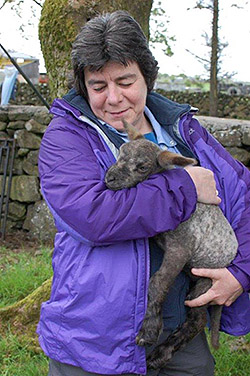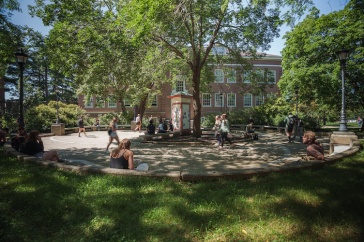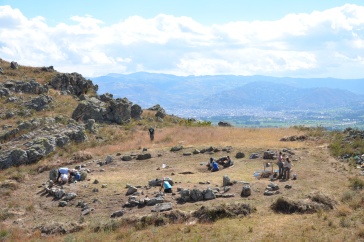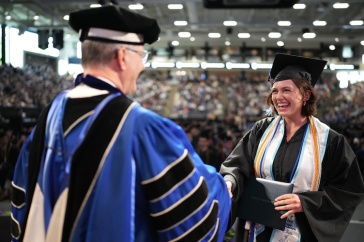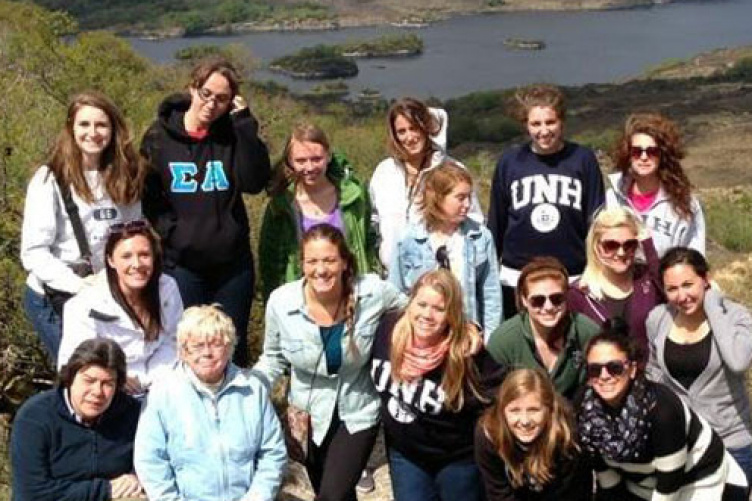
The Associate Dean of Academic Affairs for the College of Life Sciences (COLSA) at the University of New Hampshire (UNH), Kim Babbitt, is no stranger to student requests that she do more teaching. “Students frequently ask me if they are going to get a chance to take a class with me,” says Babbitt who will be teaching the graduate level College Teaching Course this fall. That’s about all she can squeeze into her overflowing responsibilities as an administrator; nevertheless, Babbitt recently delved deeper into participation with students at the academic level after Professor of Biological Sciences Patty Bedker asked Babbitt to join her course, Integration of Culture and Agriculture in Ireland: Past, Present, and Future.
“It’s a world cultures discovery class with a writing intensive component,” says Babbitt. Throughout the spring semester Babbitt attended many classes; devoured the reading assignments; learned about the cultural, historical, political, economical, and religious influences on Ireland’s agriculture, fisheries, and forestry; and prepared herself for a trip with the group of 25 students during a ten-day tour of Ireland last May. “It was hard to squeeze it in because it was right after graduation and right before freshman orientation,” Babbitt says. Even so, she is now thinking about how she might incorporate teaching a segment on Irish natural history during Bedker’s course next year. “Dean Babbitt always encouraged our discussions, and her enthusiasm for learning was contagious to all,” says Bedker. “She added another dimension to the class with her background in wildlife, ecology, and management.”
|
|
“If you look at most islands around the world, there’s a high level of endemic species,” says Babbitt. “Not in Ireland. There are a variety of factors that contributed to this: Its proximity to Scotland and the United Kingdom and mainland Europe as well as glaciation, which results in depopulation of many species.” In addition to her knowledge of natural history, Babbitt has an abiding interest in temperate and boreal forests and those green, rocky pastoral landscapes so characteristic of the Emerald Isle. “There are lots of ruins of castles and monasteries throughout the landscape, which provides us with an anchor to history,” Babbitt says. In addition, the integration of culture and agriculture is palpable across each unique county.
Integration of Culture and Agriculture in Ireland is a discovery/world cultures course in the curriculum and draws students from across many disciplines. In addition to students from COLSA – including those representing the Thompson School – there were also students with majors in English, Hospitality Management, Occupational Therapy, Chemical Engineering, and Psychology who participated. “It was a privilege to share this educational experience with Dean Babbitt,” says Bedker. “After all, in Ireland we are all students.”
Through tours of working agricultural farms and cultural landmarks, Bedker and Babbitt introduced students to a variety of producers and historians. Some of these people spoke about the devastation of the Irish Potato Famine and the mark it left on the generations that followed; the comradery between Irish emigrants to the US, notably the Boston area, who continue to support charitable causes in their homeland; and the consequences of the state of the world economy on agriculture. “It was really a nice way for students to see the results of history in the present,” says Babbitt. “These are the things that struck me as to why the trip was so wonderful for students. The semester course, readings, and discussions made the trip more meaningful because it helped students to make the connections.”
Babbitt also made personal connections with the students. “They kept asking Patty and me to come out with them,” says Babbitt who joined Bedker and the students at the King’s Head pub in Galway one evening. “There was a traditional Irish band with a female singer,” says Babbitt. “The music was so tied to the culture that the haunting songs about life and history were on a whole different level.”
Opportunities to get to know the students were abundant on the bus, during meals, and at educational sites. “I was impressed with each and every one of the students. They were so engaged with what they were learning and asked really good questions of the people we met,” says Babbitt. “Patty’s students were outstanding representatives of the University and I was very proud of them all.” As the Associate Dean of the college, Babbitt believes it’s imperative for her to stay connected with students at the academic level whenever possible because it emphasizes that they are at the center of the University’s mission. “I love interacting with students and I love teaching,” says Babbitt. “It’s a joy to see the students outside of the classroom as well, thriving as they learn through experiences like this one.”
-
Written By:
Staff writer | Communications and Public Affairs














































